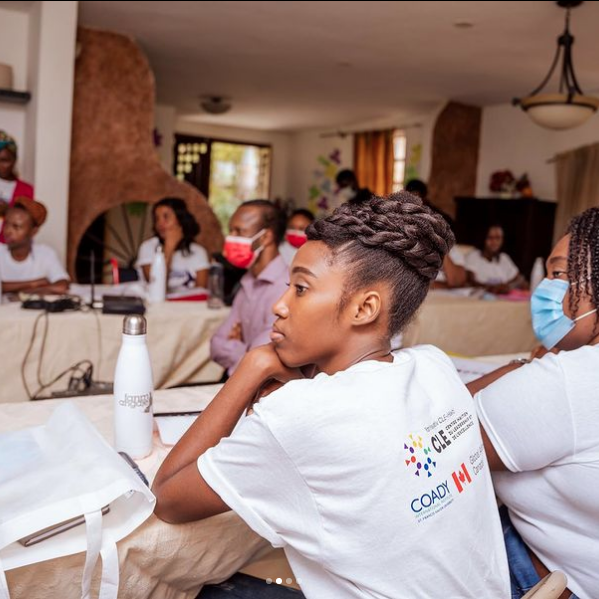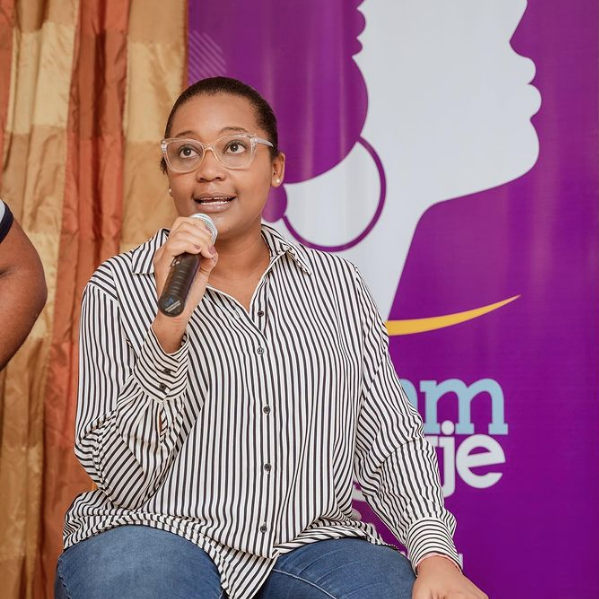ENGAGE! Women’s Empowerment and Active Citizenship is a five-year initiative co-designed by Coady Institute and five partner-organizations in Ethiopia, India, Tanzania, Bangladesh, and Haiti.
The project’s goal is to advance gender equality and poverty reduction by enhancing women’s capacity to participate in the social and economic life of their communities.
The Centre Haitien du Leadership et de l’Excellence (CLE) recently launched the Fanm Angaje Fellowship Program, despite facing significant challenges and barriers.
The women’s leadership program, supported through the ENGAGE partnership, is aimed at empowering young women working in economic development and/or social enterprise initiatives through technical training, skill development, mentorship, networking, and more.
“Through this program we also want to create a domino effect that will lead to the consideration of the opinions of Haitian women in important decisions for the country,” explains Assuntha Fleurant, Monitoring, Evaluation, and Learning (MEL) Coordinator and lead coordinator for CLE’s ENGAGE work.
“We also aim to create a network of young women social entrepreneurs working hard to achieve a more equal society.”
Supporting local leaders and scaling their ability to realize their own visions and goals for their communities is more efficient, sustainable, impactful, and perhaps most importantly, it’s a critical investment in Haiti’s future. This shared belief is the basis of CLE and Coady’s long-standing relationship.
The call for applications solicited 474 applications for 25 openings – the first of two planned cohorts totaling 50 fellows.
The 25 successful candidates are working in a wide range of areas. Some initiatives include:
- improving access to oral health care;
- transforming tires into furniture;
- a platform connecting various young clothing designers;
- a coding program for children ages 7 to 13;
- and, the construction of a training and support center for people with disabilities.
Learn more about the 25 fellows and their initiatives.


The first training program took place in October – a delay from the original plan to launch in August.
“Firstly, there was the coronavirus,” Assuntha explains. “During the month of April, several members of our program team tested positive which forced us to cease all our activities in the field, while we were in the middle of the recruitment phase for the first Fanm Angaje cohort.
“Secondly, the climate of insecurity and political instability (gangs, death of the President Jovenel Moïse, fuel shortage, kidnapping) which is rampant in Haiti has forced us to postpone several of our programmatic activities and travel which delayed us on our implementation schedule.
“Thirdly, the south of Haiti was devastated by an earthquake on August 14, 2021. As the South is one of our target departments, the place that half of our participants live and work, this program was especially affected … and the location and surroundings of the facility [we planned to use] were destroyed.”
Assuntha says their first priority was the safety and health of their staff and participants – physically and mentally. They moved some efforts online while delaying in-person trainings and relocating them to Port-au-Prince.
They also spearheaded significant relief efforts through a program called Pote Kole – an alliance of local private sector and civil society partners working to strengthen and increase access to financial resources, leadership capabilities, and coordination platforms.
“Since August, this coalition has contributed in-kind and cash donations to feed nearly 3,000 community members in Camp-Perrin, and is currently developing longer term grant making activities to support key partners in the region,” Lucia Di Poi, Executive Director for CLE, explains.
“Our primary focus is currently raising funds and launching a program to support up to 90 growth-oriented local organizations and businesses, awarding seed funding and accompaniment and leadership development services to root these organizations in a stronger economic ecosystem in the south, in the future.”
Financial supporters have come from near and far, including former New Brunswick Premier and Ambassador to the United States Frank McKenna and family – a connection made through longstanding relationships with Coady Institute and St. Francis Xavier University.
“Overall, this is much more than a relief effort. It’s an opportunity to practically support leaders, civil society, and small businesses in responding today, and in leveraging relief and reconstruction funds to build a stronger social and economic sector in the south for tomorrow.”
We want to create a domino effect that will lead to the consideration of the opinions of Haitian women in important decisions for the country. We also aim to create a network of young women social entrepreneurs working hard to achieve a more equal society.
While turning attention to relief, recovery, and sustainability from the earthquake’s devastation, CLE has also managed to resume the Fanm Angaje program – at perhaps an even more critical time.
“Supporting local leaders and scaling their ability to realize their own visions and goals for their communities is more efficient, sustainable, impactful, and perhaps most importantly, it’s a critical investment in Haiti’s future. This shared belief is the basis of CLE and Coady’s long-standing relationship,” Lucia says.
The program’s formal launch highlighted the work of the 25 selected young women leaders “who are not very well-known but who do remarkable work in society,” Assuntha explains.
Thus, began an awareness and advocacy campaign focused on elevating the voices of Haitian women.
“Several ‘duty bearers’ were present and were able to open their eyes to the change these women are making by creating wealth in their community,” Assuntha explains.
The fellows also met for the first time.
“It was amazing to see how quickly they came to an understanding and became a unit, working together and discussing their respective initiatives,” Assuntha explains. “The week was filled with knowledge-sharing and networking.”
CLE and Coady Institute have a long history of partnership and collaboration.
“Coady has been a long-standing founding partner, enabling CLE’s vision, since before CLE was even established,” Lucia explains.
“The kind of equitable partnership we’ve developed with Coady leadership and staff over the years has been invaluable to who we are today.”